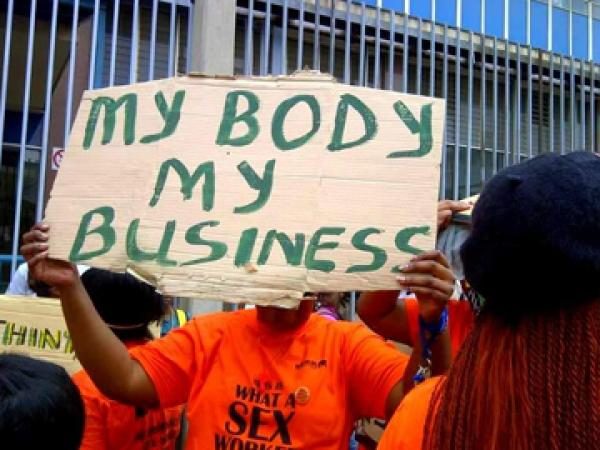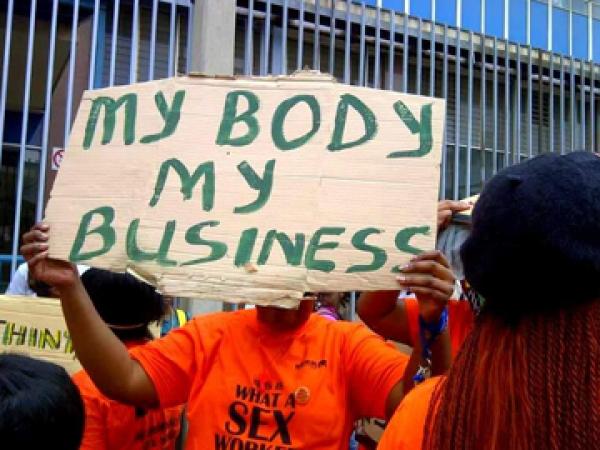
Why sex work should be decriminalised for all sex workers
There was not a single sex worker on the streets, not a single neon sign advertising a brothel and absolutely no large signs advertising a sex menu the last time I drove down the main street of Waihi. I stopped for coffee and nosed around to make sure I wasn’t missing something before declaring loudly to nobody in particular “I told you so.”
Prior to 2003 and the passing of the Prostitution Reform Act 2003 (PRA) it was one of the many ridiculous claims that was that made by way of letters to the editor and submissions to the select committee. The writer was adamant that decriminalisation would lead to Waihi becoming a sex trafficking destination and a sex tourism hot spot. The Bay of Plenty was destined to become the Phuket of the South Pacific. I wonder if he is disappointed. Or worse, is he sitting at home imagining that all the women in his community became sex workers overnight and are now secretly charging for sex at every opportunity. The author was, as is most often the case, a man.
Other claims were that WINZ would force women to work in brothels or cut off benefits; it would be taught as a subject in schools and then offered as an option by guidance counsellors; the number of sex workers would explode as women across the country rushed to throw in their day jobs and desert their children to work in the industry; every school across the country would have pimps queuing at the gate waiting to corrupt the children by getting them hooked on drugs and selling them into the slave trade; disease would run rampant, there would be people keeling over in the streets riddled with gonorrhea and infecting toilet seats across the land; and, of course, the always reliable racism couched as ‘dirty disease spreading whores.’ Changing the laws, they claimed, would undoubtedly result in the country being overrun with migrant sex workers.
None of it happened. A bit like when people were worried that homosexual law reform would make everyone gay. What decriminalisation has achieved, which was cunningly hidden in the PRA under the heading purpose, is harm minimisation. This is not a casual assertion but a fact backed by research. A requirement of the PRA was a review committee of stakeholders and funding for some robust research. It is easy to find and I have even included handy links at the end of the article here and here. What the research shows, and is still the case, is that numbers of sex workers didn’t increase, workers have a better relationship with the police, better access to health care, are able to refuse clients, challenge employment practice and if they wish to exit the industry there are less barriers. The part that I anticipated and applaud is that more workers are leaving managed premises and are working for themselves. It is all in the research.
None of these protections apply if you are a migrant worker on any type of visa. Recently Catherine Healy, the National Co-ordinator of the NZPC, who was honoured for her work in the area of prostitution and made a Dame, suggested that the part of the legislation that still criminalises women on visas be amended.
Essentially this is a law that treats workers from other countries as less worthy of protection. They are literally second-class non-citizens. We decriminalised because we recognised that criminalising people engaged in prostitution can result in some of the most marginalised people in our communities being at extra risk of even greater exploitation and harm, but the law does not extend its protection to the women who are on a visa. Workers who we know are made even more vulnerable by their immigration status.
The public outcry and the comments began again. All the same ridiculous arguments that have been proven to be nothing but unfounded moral panic used to further stigmatise and try and dehumanise the women in the industry. We will be inundated, overrun by human traffickers, there will be more sexual exploitation of children, they will drive the price down, they will undercut the market, and of course it’s only a matter of time until Waihi and Katikati become the Sodom and Gomorrah with STIs replacing PSA as the major disease of concern. Of course for any of that to happen every man in the country would have to decide to become a client overnight and most of the women too. Not only that but we would have to stop enforcing all the other legislation we have in place that criminalises things like slavery, trafficking, child abuse, rape, consent and our immigration laws.
While the hysteria of the opposition reaches meth testing fury they conveniently ignore the reality that we already have a population of women working in the sex industry that are migrants. We have done as long as I can remember. Whether it be the Thai parlours of the 80’s first run by Rainton Hastie, or the constant stream of back packers from across the globe, or the students working 20 hours, we have always had migrant sex workers. Not all sex worker that cross a border are trafficked, some are just on an OE. Just as Kiwi sex workers still travel to the hostess bars of Tokyo, Kalgoorlie or Hong Kong in search of better earnings and adventure, workers from other countries want to come and work here.
The slurs and misogynistic ranting that is being passed off as paternalistic pastoral care has not changed and is no surprise. What has changed and is surprising is who is saying it and the need they have to weigh in. Men who are generally well informed and who supported decriminalisation in 2003, and yet now do not want to extend those rights to migrant workers. How you can support law reform for one group of women but not extend it to another group makes no sense. If there are migrant workers here that are working under duress, or have been trafficked, how does criminalising those women help? How does it assist them?
The tired tropes being run out are nothing more than that, but the men saying it should know better. What’s more, as they are not experts in the matter, why do they feel the need to contribute at all? Whether a migrant rights activist, a trade unionist or just exploring a newly discovered SWERF within, unless you have worked in the industry you should stop comparing sex workers to hospo workers and fruit pickers. These are the men that should be either supporting the move to decriminalise, or choosing to refrain from commenting at all.
Watching The Deuce and reading grey source research funded by large religious charities does not make you an expert on human trafficking and the sex industry. The women who work in the industry or volunteer at NZPC are experts. It is their voices and their experiences that we should be listening to. When you chose to speak out on this issue, it often comes at great personal cost. Women who speak out are brave and bravery alone should give weight to their words.
The PRA has achieved a lot, but the PRA never claimed it would do is stop men murdering and abusing women, stop men wanting to sexually abuse children, stop some brothel owners and other business owners from ripping off their workers, end exploitative work conditions and stop international human trafficking. There is still work to do. Like many work places there are plenty of bosses that will exploit their workers putting profit before people, but law reform has helped give sex workers agency. Now let’s extend that agency and that care and respect to everyone working in the industry.
I’m proud of the fact that in NZ we decriminalised a law that discriminated against women and introduced legislation designed to reduce the harms of the industry. I am deeply ashamed that the legislation discriminates against migrants. The PRA has led the charge for other countries to examine their laws. Let’s finish the job, by letting migrant sex workers charge as well.






The key word here is work. Why should a sex worker be able to work here without a work permit while all others are not.
I’m pretty sure that the only people who are allowed to work as sex workers in NZ are NZ citizens who are born here. People coming in from overseas to work as sex workers quite literally cannot get a work permit because it’s illegal for them to work here.
So having sex is ‘work’ now? I’ll send my partner an invoice next time.
WTF?
Shat does the ‘F’ in WTF stand for, ‘work’ or fun?
Opening up the labour market to anyone in the world who wants to work here is bad policy generally. And that would apply to any particular labour sector, excepting where there are local shortages.
This particular labour market is somewhat unique because the work is often illegal in other economies. For the moment it only involves those working here illegally, which results in them working for those who running operations outside of the regulations (house brothels) or via personal ads.
Enabling legal work would allow the brothel or escort agency to hire them as well (increasing the supply of workers here, either displacing locals or reducing the number of customers per worker). But with a likelihood of the migrant labour numbers increasing substantially the risk is that there will be a group of new entrepreneurs who will bring their workers in from offshore in relays (as some do in the Auckland construction industry). Meaning new urban brothels, an explosion in suburban house brothels and escort agency workers set up in apartments.
And yeah, the Americans will accuse us of trafficking in sex workers. And will anyone in the NZPC be able to say none of those involved are not involved in illegal sex work in other countries (in both the work and supply of workers)? No.
Or, looked at another way, why should the New Zealand sex industry be sheltered from the same immigration-driven attacks on wages and conditions that all other Kiwi workers have had to endure?
Cui bonno Kate? Nobody would be happier to see your reforms than the brothel owners. Is that who this is really for? When the number of workers applying for every parlour job suddenly doubles, you don’t need to be a math genius to figure out that wages will soon be halved.
It seems Rogernomics has finally caught up with the Oldest Profession. Good luck girls. Looks like you’re going to need it by the time Kate gets finished with you.
Censorship continues on TDB, Kiwiblog is looking ever more friendly now.
Hi Kate Dickie-Davis
Very nice article, thanks for sharing. keep up the good work
Prostitution is impossible. Women can’t do it, in general. No matter the prospectus.
Hence the extraordinary charges in the closed market of NZ and the breakdown of prostitution in the provinces.
Yet the eternal call of the prospectus.
All Good Fun.
Prostitution is impossible. Women can’t do it, in general. No matter the prospectus.
Hence the extraordinary charges in the closed market of NZ and the breakdown of prostitution in the provinces.
Yet the eternal call of the prospectus.
All Good Fun.
Comments are closed.